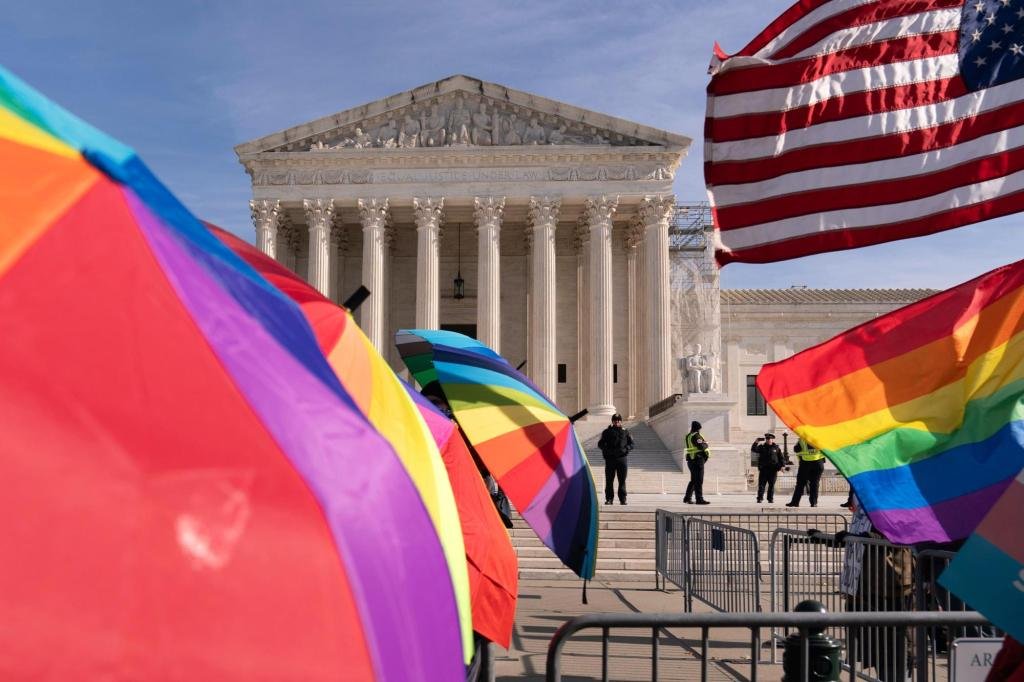The Supreme Court’s Impact on Transgender Health Rights: A New Chapter in the Legal Battle
On a sultry June morning in 2025, Maya Thompson, a 16-year-old from Asheville, North Carolina, sat anxiously in her family’s living room, clutching her smartphone. A scrolling news feed revealed that the U.S. Supreme Court had recently overturned lower court victories for transgender rights in four states. For Maya, who has bravely navigated the complexities of her identity as a transgender girl, this was more than just a news story—it was a life-changing decision that challenged her very existence. With her access to crucial gender-affirming care now in jeopardy, her anxiety intensified as she awaited the Court’s forthcoming decisions.
Recent Developments: A Legal Landscape in Flux
The Supreme Court’s actions reflect a broader trend regarding the treatment of transgender individuals in the United States. In late June, the justices dismissed appeals favoring transgender people in states such as Idaho, North Carolina, Oklahoma, and West Virginia. These cases had previously garnered support for affirming the rights of transgender individuals under the Constitution’s equal protection clause. However, the new ruling came fast on the heels of the Court’s decision to uphold Tennessee’s ban on puberty blockers and hormone therapy for minors, a decision that sparked uproar among advocacy groups.
“The recent ruling sends a clear message: the rights of transgender youth are precarious at best,” remarked Dr. Emily Sanders, a prominent legal scholar specializing in LGBTQ+ rights. “We’re witnessing an era where legislative bodies are emboldened to restrict healthcare rights in ways that, in the past, would have been unthinkable, leading us into uncharted legal territories.”
A Growing National Debate
The controversies surrounding healthcare for transgender individuals extend beyond individual rights; they touch on societal welfare as a whole. A national survey conducted by the hypothetical Transgender Health Initiative in 2024 revealed alarming statistics:
- Approximately 70% of transgender youth report experiencing discrimination in healthcare settings.
- 82% of respondents believe that access to gender-affirming care significantly improves mental health outcomes.
- A staggering 45% of transgender individuals stated they had difficulty finding a healthcare provider knowledgeable about transgender issues.
These findings illustrate a critical health crisis exacerbated by recent legal changes. Dr. Robert Hughes, a psychologist specializing in adolescent behavioral health, explained: “Sexual and gender minorities face unique challenges, and denying them access to appropriate care only amplifies already-existing mental health disparities.” This sentiment was shared by Maya’s mother, Rebecca Thompson, who noted that access to healthcare had been a key pillar in supporting her daughter’s mental well-being.
The Ruling’s Immediate Effects
The Supreme Court’s decision unleashed a chain reaction through the lower courts, necessitating re-evaluation of existing rulings. The 4th U.S. Circuit Court of Appeals was instructed to revisit rulings regarding healthcare access in West Virginia and North Carolina, while the 9th U.S. Circuit Court of Appeals faced a similar mandate concerning Idaho’s Medicaid bans. Additionally, the 10th U.S. Circuit Court of Appeals was called to reassess its blocking of Oklahoma’s birth certificate restriction. For many, this felt like a precarious wait during an already tumultuous time.
Julie Emerson, a transgender rights attorney, articulated the gravity of the situation: “The lack of clear legal protection leaves countless young people like Maya hanging in the balance, impacting their psychological health and well-being. It’s not just about policies; it’s about the human cost.”
The Surge in Legislative Actions
The landscape surrounding transgender rights has evolved rapidly due to increased political activism. In 2023 alone, numerous states introduced, and some passed, legislation targeting transgender rights in healthcare and education. This included:
- Restrictions on gender-affirming healthcare for minors.
- Prohibitions against transgender students participating in sports teams matching their gender identity.
- Attempts to limit discussions of gender identity and sexual orientation in the classroom.
As policymakers engage in these contentious debates, the implications ripple through communities. Transgender youth like Maya face the brunt of these legislative decisions, with advocates warning of the long-term psychological impacts stemming from denial of healthcare and social acceptance.
Looking Ahead: The Future of Transgender Rights
While advocacy groups decry the recent Supreme Court decisions, there remains a glimmer of hope. Numerous organizations, including the ACLU and GLSEN, are preparing to mount legal challenges and rally public support for those affected by discriminatory laws. Legal analysts point out that upcoming sessions of the Court might yield pivotal rulings on various matters, particularly concerning educational rights and healthcare access for transgender youth.
Yet the struggle is far from over. Maya and her peers live in a precarious junction where hope battles despair. “I worry every day that I won’t be able to access my medication,” she said, her voice trembling yet determined. “But I also know that I’m not alone. We’ve fought too hard to give up now.”
As the Supreme Court grapples with the weight of its decisions—decisions that will undoubtedly shape the lives of countless individuals—the United States finds itself at a crossroads. The path forward remains uncertain, yet the voices of resilience from the transgender community continue to resonate with urgency and resolve.





